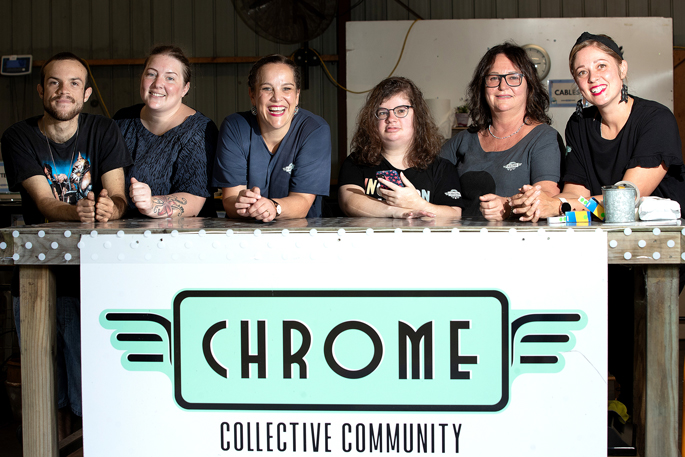A non-profit collective that’s working hard to immerse people with disabilities back into the community, and in turn creating long-term employment for them, is in dire need of funding.
Katikati-based Chrome Collective’s main focus is to create long-term employment opportunities for people with disabilities, says operations manager Sharaine Steenberg.
“We do this by welcoming people with disabilities into the larger community, to fully participate in life at the same level and non-disabled individuals with benefits to all.
“Our long-term aim is to enable good lives of people with disabilities – according to the Enabling Good Lives principles,” says Sharaine.
They do this by creating and supporting meaningful microbusinesses, vocational training, enabling and developing employment opportunities; and by advocating for rights for the disabled community.
Sharaine says Chrome Collective programme runs alongside the Resource Recovery Centre in Katikati.
The centre is a community recycling and resource recovery facility that generates revenue from the sale of goods and materials contributed by the local community.
“We’ve been introducing our Chrome Collective crew into the services. They’re helping us do a lot of sorting and fixing things.”
But funds to keep the work going are waning. Sharaine says people can help Chrome Collective carry on its work in three ways.
“Financial donations are number one for us, it just fills the gaps where we have them.
“But people can also buy a product. People can buy products from our online store.”
Sharaine says the third option is for people to drop off reusable items at the resource recovery centre.
“That’s how we generate income. The more people we have coming through the centre, the more income we can generate.”
Sharaine says the combination of high living costs and the recession means there’s fewer funding opportunities on offer – and being based in a small place like Katikati makes it hard too.
“We’re continuing to do the work, but we need those funds to survive. The more funding we get, the more people we can support.”
Chrome’s two programmes most reliant on funding are vocational training and food rescue.
Vocational training programme runs three days weekly with 25 participants – to prepare Chrome participants to have good lives and live independently.
“There’s a lot of work when it comes to people with disabilities, the care and support they need versus someone that doesn’t have a disability. It means we need two staff plus volunteers to run a group of eight.
“So we really need experienced staff that we need to be able to pay and afford to do the work that we need them to do.
Chrome’s food rescue programme also desperately needs funding.
“A part of our sustainability environmental focus that Chrome has, we’ve got a food rescue.
“There’s a serious need in our community – but the lack of funds is significant for the food rescue industry all over the country.
“Good Neighbour helped us set up the food rescue so we go and pick up food from them once-a-week, as well as Katikati Countdown and Freshchoice Omokoroa daily, then we distribute locally.”
Sharaine says the food rescue, training programme and resource recovery centre are innovative ways Chrome has come up with to help people with disabilities in the community while also helping look after the environment and those in need.
“Chrome Collective works with people with disabilities from Ōmokoroa to Waihī,” says Sharaine, who believes more than 400 people registered with a disability live in the Katikati area.
For more information, or to donate or purchase products, visit: chromecollective.co.nz

